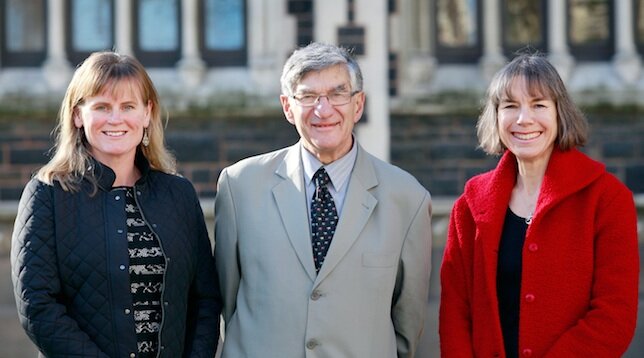EDOR – the Edgar Diabetes and Obesity Research Centre
The Edgar Diabetes and Obesity Research Centre maintains a humming office in the Dunedin School of Medicine. Five core staff work there, while 21 other team members are spread throughout Otago University and other academic institutions around the country.
EDOR directors Professor Rachael Taylor, Professor Jim Mann and Associate Professor Kirsten Coppell.
Work is overseen by the EDOR advisory board, which until his passing in June 2021 was chaired by Sir Eion Edgar. That work is prolific, covering areas from gestational diabetes to childhood obesity to the value of flash glucose monitors for teenagers, and more.
EDOR Research Manager Dr Cherie Stayner says
“EDOR is known internationally for its work relating to the role of nutrition in the management and prevention of diabetes.”
Professor Louise Signal has used wearable cameras to document that “Kiwi kids are being bombarded with an average of 27 junk food advertisements a day in their schools, homes and on the streets. And that doesn’t include the advertising seen on television, in dairies and in supermarkets, as there was simply too much of it to count.”
Hunger Training is another exciting area of research for EDOR. EDOR Director Professor Rachael Taylor says “Hunger training may help prevent type 2 diabetes by training you how to listen to your appetite, and only eating when your body needs it.”
In New Zealand and internationally, EDOR members have developed nutrition guidelines for reducing the risk of type 2 diabetes, and also guidelines for the management of diabetes. “For many years, guideline development in Europe was led from EDOR through our involvement with the European Association for the Study of Diabetes. We’ve also been closely involved with the nutrition related activities of the World Health Organization, and the provision of relevant advice at the national and international level.”
Wholegrains research
EDOR researchers are contributing significantly to knowledge around wholegrains. Professor Jim Mann says, “Regular consumption of wholegrains is recommended to reduce the incidence of diseases such as type 2 diabetes, cardiovascular disease and colorectal cancer.” But there’s a problem. “Many of the wholegrain labelled products that people consume contain largely refined grains.
“Research indicates that the structure of the grain may influence the food’s effect on metabolic measurements and clinical outcomes.”
EDOR researchers wanted to understand this better. Their first Grain Study “tested the effect of wholegrain products with different particle size on the blood glucose control and cardiometabolic risk factors of adults with type 2 diabetes”.
The study’s results were promising, and the EDOR team is building on them with a new project: adults with type 2 diabetes living in Dunedin are participating in a trial. Study lead Dr Andrew Reynolds explains, “Our participants receive wholegrain foods for periods of two weeks, and wear continuous glucose monitors, so we can see how their blood glucose levels respond throughout the day and night. As this short-term trial is nearly complete, next year we will start a 12-week trial at multiple sites around New Zealand also looking at wholegrain intake and blood sugar control.”
Young researchers
EDOR enthusiastically mentors young researchers. Dr Stayner cites Dr Andrew Reynolds as an example.
“Andrew started as a PhD student back in 2013. His ‘walking after meals’ PhD study received huge publicity worldwide.
“Andrew graduated in 2016 and has stayed with us as a researcher involved with a range of projects on physical activity and diet in the prevention and management of type 2 diabetes. He primarily works with Professor Jim Mann and another EDOR researcher, Dr Lisa Te Morenga, and all work with the World Health Organization and the Diabetes Nutrition Study Group of the European Association for the Study of Diabetes.
“We also have a fantastic group of young researchers and students that we call the DREAM team, who are investigating sleep and sedentary behaviour in children and adolescents.
“Not getting enough sleep doubles the risk of child obesity, most likely by increasing energy intake. Why this happens is uncertain but understanding how inadequate sleep promotes overeating would provide us with new tools in the fight against obesity.
“We’re comparing dietary intake, eating behaviour, physical activity levels, and changes in parenting when children have plenty of sleep and when they undergo a mild level of sleep deprivation.
“To do this, we’re making use of new technologies such as wearable cameras which record children in their home, school and recreation environments.” The recordings are used “to assess why we eat differently when we’re tired compared to when we feel rested”.
Walking after meals: Exciting findings
The EDOR “walking after meals” study prescribed walking to 41 patients with type 2 diabetes in two-week blocks, separated by a month.
The patients were fitted with accelerometers to measure their physical activity, and devices that measured their blood sugar every five minutes. They were asked to walk either for 30 minutes a day, as advised by current guidelines, or to walk for 10 minutes after each main meal. The results indicated that walking after meals is better at reducing blood sugar levels than taking a single 30-minute walk at any time of the day.
Education and promotion
EDOR regularly runs large symposia and public lectures on topics of national importance. In 2017 and 2018, the Centre joined with the Pacific Rugby Players Association, the Healthier Lives National Science Challenge, and private philanthropists to “sponsor a series of short films starring high profile Pacific rugby players, which incorporate messaging about healthy lifestyles alongside entertainment”.
For EDOR, it’s never enough to simply do the research. The Centre is committed to making sure their findings get out to where they’re needed.
The EDOR team acknowledges funding from a wide variety of sources.
**This article about EDOR first appeared in the Summer 2019 issue of Diabetes Wellness magazine. Subscribe to the magazine today to receive your copy.

